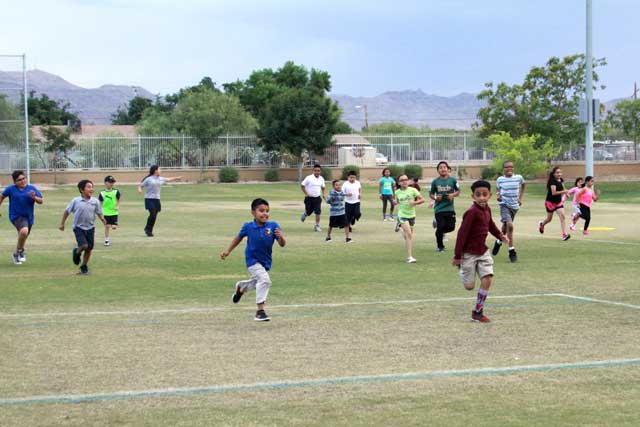Initiative teaches the foundation of health, wellness and self-confidence
By Christin Thieme –

“What’s a purple vegetable?” a staff member yelled out.
“Eggplant!”
The whistle blew, and off they went, sprinting to the purple mark on the field and back again for another round.
It was the aerobic piece of a three-part program for kids ages 6–11 held Monday through Friday from 6–7:30 p.m. It aims to teach the foundation of health and wellness, and how to become confident leaders.
“It’s less scientific and more really adaptive,” said Dwight Pete, Fitness Coordinator at the Kroc Center, who developed and directs the kids’ program. “We want to make sure these kids are educated the right way early on, to know what foods help the body and how, and ways they can be physical without equipment.”

“The intent is to teach kids the confidence to make healthy choices and to believe in themselves,” said Kara Cline, Healthy Army Program Director. “The ultimate goal is to influence, educate and empower individuals to make sound, healthy choices that will guide their actions and help them be good stewards of their bodies. We want people to believe they can do it and teach them the tools to do so.”
Corps Officer Lt. Gene Apuan has seen the program work at the Tempe Corps. A first-degree black belt in mixed martial arts, Apuan incorporates the wellness training in the Thursday Troops activities at the corps. With no outdoor space, he uses the corps hall as a multipurpose room—a punching bag sits in the back corner.
“Healthy physical activities help your self-image and self-confidence,” Apuan said. “Paul talks about disciplining and ‘beating’ his body in readying himself (1 Cor. 9). We have to train physically as well as spiritually as soldiers.”
Apuan ensures the physical instruction is built around a spiritual concept, helping the 12 regular attendees understand that “God wants us to take care of our bodies,” he said. “We teach it’s the whole person you want to take care of.”

“Best practices” and “train the trainer” elements of the curriculum will help all coaches understand the principles of the program and how to best incorporate it into their ministry setting, whether it be for kids, seniors or everyone in between.
But it is not only for kids.
Cline taught a 12-week series for domestic violence survivors at the Phoenix City Family and Shelter Program, covering topics from how to eat healthy on food stamps to how to exercise where you are.
“We talk about strength—inner and external strength—and that you can do things even if people say you can’t,” she said. “It’s about giving people tools.”
Listen to this article











